RASC News Agency: Mohammad Khalid Hanafi, the Taliban’s Minister for the Promotion of Virtue and Prevention of Vice, has called for what he termed “mutual respect” between graduates of secular universities and students of religious seminaries. Speaking in an audio message disseminated by his ministry, Hanafi urged that madrasa graduates should not be viewed with “contempt or humiliation.” “Graduates of Kabul University, including doctors, engineers, and other professionals, must not look down upon Islamic scholars,” he said. Hanafi further emphasized that respect must be reciprocal, adding that seminary students should also refrain from harboring negative perceptions of university graduates.
These comments come at a time when the Taliban continue their systematic marginalization of Afghanistan’s academic elite. Since reclaiming power in August 2021, the group has pressured thousands of university professors and graduates to either flee the country or abandon their professions amid intensifying ideological constraints and political repression. Just two weeks ago, local sources confirmed to RASC-affiliated media that the Taliban had dismissed at least 16 university professors from Islamic faculties in the provinces of Ghazni, Bamyan, Logar, Panjshir, and Paktika. The dismissals, according to these sources, were prompted by the lecturers’ opposition to the Taliban’s doctrinal positions.
An official letter obtained by RASC cited these dismissals as part of efforts to “improve and streamline academic processes,” though critics argue the Taliban are replacing academic integrity with ideological conformity. This pattern, they say, reflects a broader campaign to suppress intellectual independence and transform higher education into a tool of religious indoctrination. Over the past three years, the Taliban have established thousands of seminaries and religious schools across the country, many with militant and fundamentalist orientations. Internal documents reviewed by RASC reveal that the group has awarded postgraduate degrees, including master’s diplomas, to numerous madrasa graduates some of whom received their training in Pakistani religious institutions.
Observers warn that the Taliban’s attempt to equate religious schooling with formal higher education represents a calculated effort to delegitimize secular academia and to elevate unqualified loyalists to positions of influence. Their narrative of “mutual respect” stands in stark contrast to the regime’s actions: dismissals of educators, closures of independent institutions, and the proliferation of extremist curricula. Far from fostering mutual understanding, the Taliban’s policies are accelerating the collapse of Afghanistan’s academic infrastructure and silencing voices that once championed scientific advancement, human rights, and modern development. The rhetoric of respect rings hollow in the face of a regime bent on enforcing obedience, not dialogue.






